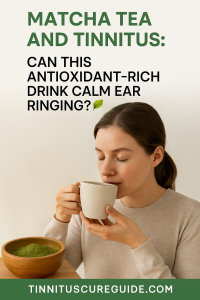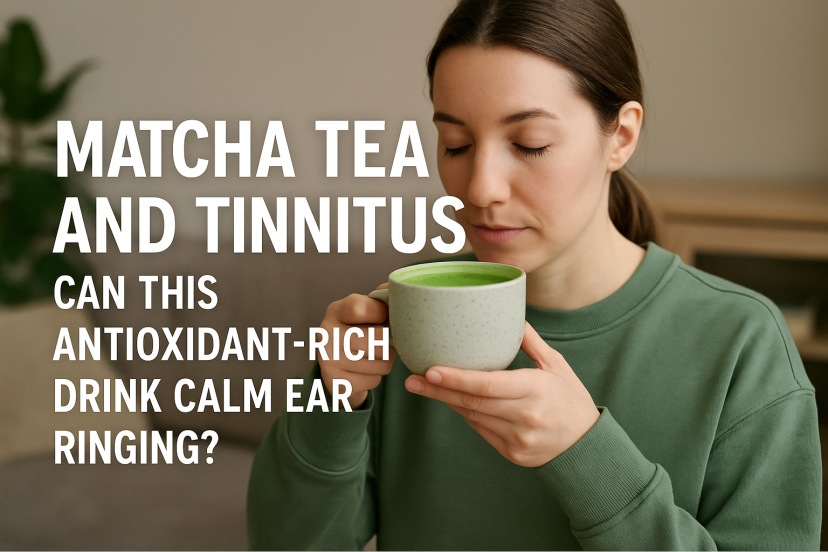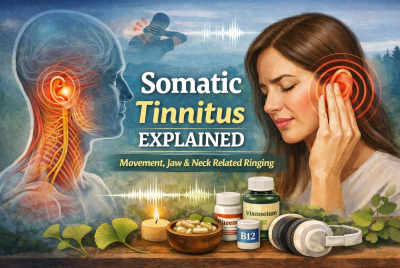Matcha Tea and Tinnitus: Does This Antioxidant Superdrink Help Reduce Ringing?
🔊 Can a Daily Cup of Matcha Really Help Tinnitus?
If you live with tinnitus, you know how exhausting the constant ringing, buzzing, or whooshing can feel—especially when stress, fatigue, or diet make symptoms spike. Many people search for natural ways to calm their nervous system, reduce inflammation, and improve their overall ear health. One remedy gaining massive popularity is matcha tea.
Matcha isn’t just trendy—it’s one of the most antioxidant-rich drinks on earth. Packed with L-theanine, polyphenols, and chlorophyll, it offers calming and anti-inflammatory benefits that may indirectly help people with tinnitus feel more balanced and less stressed.
But can matcha actually reduce tinnitus? Or is it just another wellness fad?
This guide breaks down everything you need to know: the science behind matcha, how its compounds affect tinnitus triggers, who should be cautious, and how to build a matcha routine that supports long-term ear health.
🌿 What Makes Matcha Different From Regular Green Tea?
Matcha is a finely ground powder made from whole green tea leaves grown in shade. Because you consume the entire leaf—not just the brewed water—you get a significantly higher concentration of nutrients.
Here’s what sets matcha apart:
-
Higher Antioxidant Levels
-
Stronger Anti-Inflammatory Benefits
-
Rich in L-Theanine (a calming amino acid)
-
Contains Chlorophyll for Detox Support
-
More Stable Caffeine Delivery with Less Jitter
This nutrient density is exactly why so many people are turning to matcha for stress management, focus, and natural wellness support—all important for tinnitus management.
💚 How Matcha’s Antioxidants May Support Ear Health
One of the biggest concerns behind tinnitus is oxidative stress—cell damage caused by free radicals. Research shows oxidative stress can impact the inner ear and auditory pathways.
Matcha is loaded with EGCG (epigallocatechin gallate), a green-tea polyphenol known for:
-
Reducing Inflammation
-
Protecting Cells From Oxidative Damage
-
Supporting Healthy Circulation
-
Improving Immune Response
Why This Matters for Tinnitus
EGCG doesn’t “treat” tinnitus, but it may help create a healthier environment inside the ear by reducing inflammation and supporting cellular health.
For many people, this means fewer flare-ups caused by stress or inflammation.
🧘♀️ L-Theanine: Matcha’s Secret Weapon Against Tinnitus Stress
If you’ve ever noticed tinnitus getting worse during stressful moments, you’re not alone. Stress is one of the most common tinnitus triggers.
Matcha contains L-theanine, a rare amino acid known for promoting relaxation and improving mental clarity—without drowsiness.
Benefits of L-Theanine for Tinnitus
-
Supports Calm and Focused Brain Activity
-
Reduces Cortisol Levels
-
Helps Prevent Anxiety-Driven Tinnitus Spikes
-
Improves Sleep Quality (Especially When Consumed Earlier in the Day)
Studies show L-theanine increases alpha brain waves, the same brainwaves associated with meditation and deep relaxation. For tinnitus sufferers, this can help the nervous system stay balanced—potentially leading to more stable, manageable symptoms.
🔬 Does Matcha Actually Reduce Tinnitus? Here’s What Science Says
To be direct: matcha is not a cure for tinnitus. No tea, herb, or supplement can “turn off” ringing completely.
However, matcha can support the systems that influence tinnitus intensity:
1. Reduces Stress Response
Lower cortisol = fewer stress-triggered spikes.
2. Helps Combat Inflammation
Inflammation in the auditory nerve and surrounding tissues can worsen tinnitus.
3. Supports Better Blood Flow
Healthy circulation is essential for delivering nutrients to the inner ear.
4. Provides Antioxidant Protection
EGCG may help protect against cellular damage inside the cochlea.
5. Improves Mental Clarity and Emotional Stability
Helpful for people whose tinnitus worsens with frustration or overwhelm.
The Bottom Line
Matcha supports whole-body health in ways that can make tinnitus more manageable, especially for people who notice a pattern between stress, diet, and flare-ups.
⚠️ When Matcha MAY Make Tinnitus Worse (Important!)
While matcha has many benefits, it’s not ideal for everyone—especially those sensitive to caffeine.
Matcha contains more caffeine than regular green tea. For some people, caffeine can:
-
Trigger Faster Heart Rate
-
Make Tinnitus Louder or More Noticeable
-
Causes Sleep Problems if Taken Too Late
Who Should Be Cautious With Matcha
-
People with caffeine sensitivity
-
Individuals taking stimulants
-
Those with high anxiety
-
People with blood pressure issues
-
Anyone who notices ringing increases after coffee or tea
If you’re unsure, start with a very small serving and monitor your symptoms.
☕ How Much Matcha Is Safe for People With Tinnitus?
A safe starting point for most adults is:
½ teaspoon (1 gram) of matcha once daily
You can gradually increase to:
1 teaspoon (2 grams) per day
—but only if it does not worsen your symptoms.
Best Time to Drink Matcha for Tinnitus
-
Morning for energy, mental clarity, and stress control
-
Early afternoon for gentle focus without a crash
Avoid matcha after 3 PM, as caffeine can disrupt sleep, one of the biggest contributors to nighttime tinnitus spikes.
🌱 How to Choose the Right Matcha to Support Tinnitus Relief
Quality matters. Low-grade matcha can contain contaminants, bitter flavors, and higher caffeine levels.
Here’s what to look for:
-
Ceremonial Grade Matcha
-
Organic, Shade-Grown
-
Bright Green Color (Not Yellow or Brownish)
-
From Japan (Uji, Nishio, Shizuoka, or Kyushu)
-
Tested for Heavy Metals
Avoid cheap matcha powders—they’re often bitter, harsh, and much less effective for wellness benefits.
✅ A Simple Matcha Ritual for Calming Tinnitus
Building a daily matcha ritual can help your nervous system feel calmer, clearer, and more grounded.
Here’s a gentle, tinnitus-friendly routine:
Step 1: Heat Water (Not Boiling)
Use water around 160–175°F (hot but not bubbling).
Boiling water ruins matcha’s L-theanine.
Step 2: Whisk ½ Teaspoon of Matcha
Use a bamboo whisk or electric frother.
Step 3: Add a Splash of Milk or Oat Milk
Creamy textures improve flavor and smoothness.
Step 4: Sit Quietly and Sip Slowly
Combine your drink with:
-
Deep breathing
-
Relaxed posture
-
Soft ambient sound (white noise or nature sounds)
This simple practice can reduce anxiety-driven spikes and help your body transition into calmer, quieter states.
🌿 Matcha Latte Recipe for Tinnitus Calm (5 Minutes)
Here’s a quick recipe designed for relaxation:
Ingredients
-
½–1 teaspoon ceremonial matcha
-
1 cup milk or dairy alternative
-
1 teaspoon honey or monk fruit (optional)
-
Hot water (160–175°F)
Instructions
-
Add matcha to a cup.
-
Pour 2 tablespoons of hot water.
-
Whisk until frothy.
-
Warm milk separately.
-
Combine with matcha.
-
Sweeten lightly if desired.
This creates a smooth, calming latte with steady-focus energy—perfect for morning relaxation.
🌿 Matcha vs. Green Tea: Which Is Better for Tinnitus?
Many tinnitus sufferers drink green tea, so how does it compare?
Matcha May Be Better Because:
-
Stronger Antioxidant Concentration
-
More L-Theanine (Calming Effect)
-
More Stable Caffeine Release
-
Whole-Leaf Consumption Means More Nutrients
Green Tea May Be Better For:
-
People extremely sensitive to caffeine
-
Those wanting a lighter flavor
-
Evening drinkers
If caffeine worsens your tinnitus, green tea—or even herbal teas like chamomile or lemon balm—may be a safer choice.
🌙 Matcha and Sleep: Important Notes for Tinnitus Sufferers
Sleep and tinnitus are deeply connected.
When sleep quality worsens, ringing often becomes:
-
Louder
-
More intrusive
-
More stressful
-
Harder to ignore at night
Matcha can help regulate sleep by lowering stress and providing calm focus—but only when consumed early in the day.
🚫 Do NOT drink matcha after 3 PM
Even small amounts of caffeine can cause nighttime ringing to intensify.
For evenings, try caffeine-free alternatives like:
-
Chamomile
-
Rooibos
-
Lavender tea
-
Peppermint
-
Lemon balm
These can help prepare the brain for sleep and mask nighttime ringing.
☕ Should You Replace Coffee With Matcha If You Have Tinnitus?
For many people, the answer is yes—or at least try it.
Coffee can cause rapid caffeine spikes, which may increase:
-
Anxiety
-
Heart rate
-
Cortisol
-
Auditory sensitivity
Matcha delivers caffeine more smoothly and evenly, thanks to L-theanine.
People who switch from coffee to matcha often report:
-
Less jitteriness
-
More stable tinnitus
-
Better mood
-
Smoother energy
If coffee triggers your tinnitus, matcha can be an excellent replacement.
❓ Frequently Asked Questions About Matcha & Tinnitus
Can matcha cure tinnitus?
No. Matcha cannot cure tinnitus, but it may help reduce stress and inflammation—two major contributors to flare-ups.
How long does it take to notice benefits?
Most people feel calmer within 20–40 minutes after drinking matcha. Long-term antioxidant benefits develop over 2–4 weeks.
Is matcha safe for daily use?
Yes—for most adults. But start small and monitor your tinnitus.
Does matcha help with anxiety-driven tinnitus?
It can. L-theanine promotes relaxation and reduces stress hormones.
Is matcha okay during tinnitus spikes?
If caffeine is a trigger for you, skip it. If not, matcha may help you stay calm during a spike.
✅ Final Takeaway: Is Matcha Good for Tinnitus?
Matcha won’t make tinnitus disappear—but it can support a calmer, healthier, more stable internal environment that makes symptoms easier to manage.
Its powerful combination of antioxidants, L-theanine, and steady energy can help:
-
Reduce stress-driven spikes
-
Support anti-inflammatory processes
-
Protect inner-ear cells from oxidative stress
-
Improve mental clarity and emotional balance
Suppose you’re looking for a natural addition to your tinnitus wellness routine. In that case, a daily matcha ritual may offer noticeable relief and calm—especially when combined with stress reduction, good sleep hygiene, and healthy daily habits.
 Disclaimer
Disclaimer
This article is for informational purposes only and is not a substitute for medical advice. Always consult a qualified healthcare provider or audiologist for diagnosis and treatment of tinnitus or related conditions.




 Disclaimer
Disclaimer

